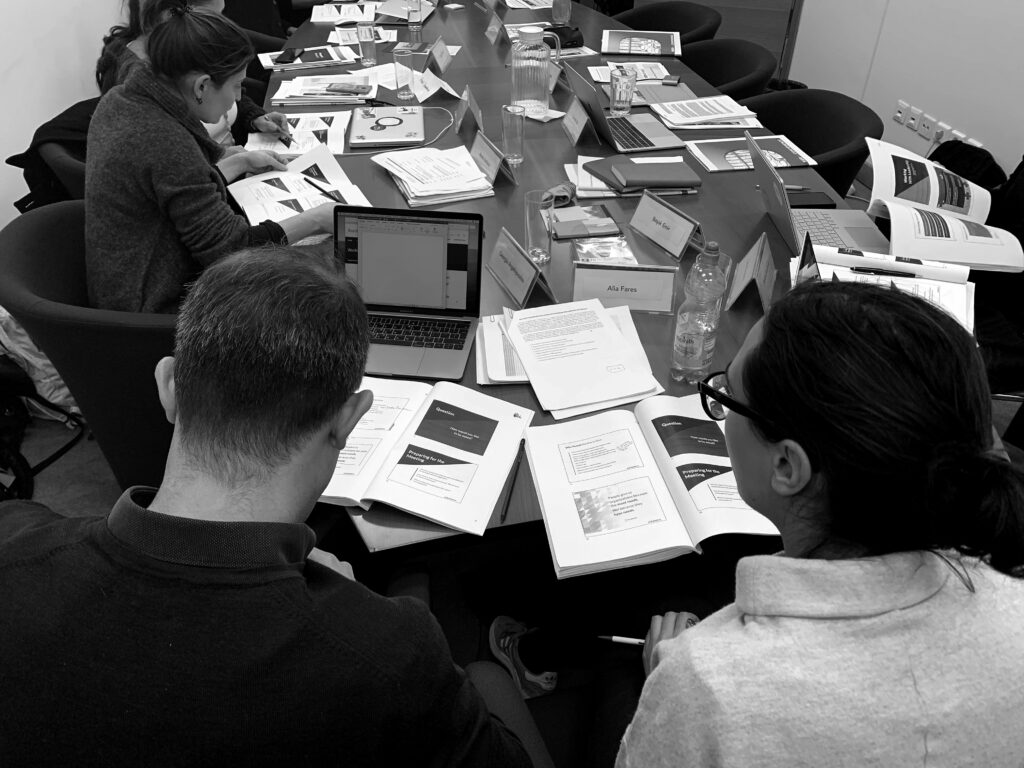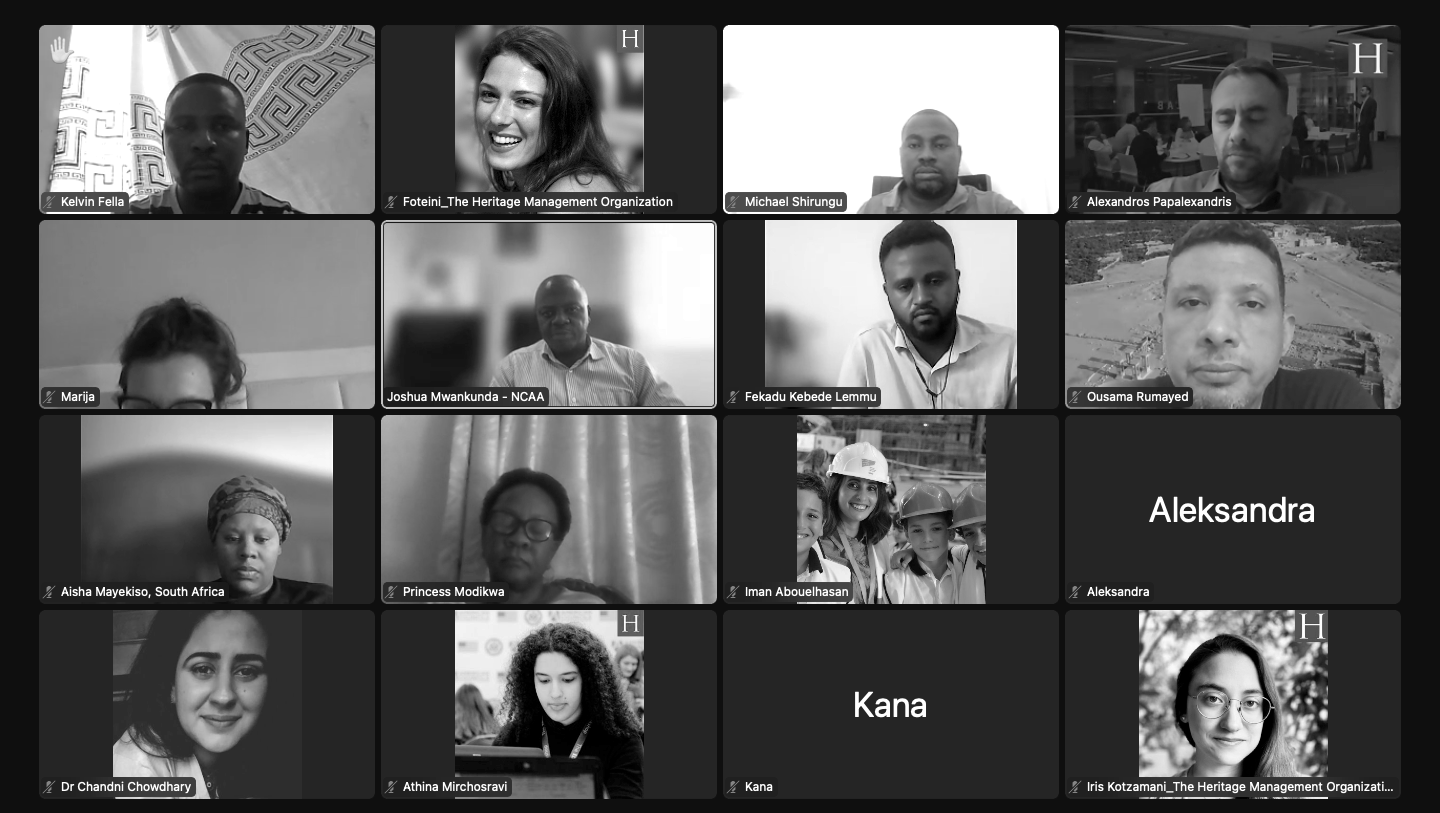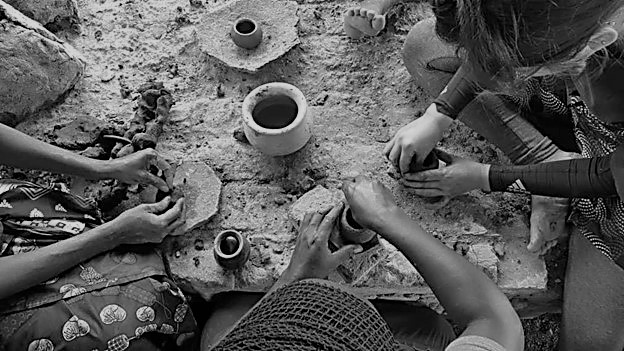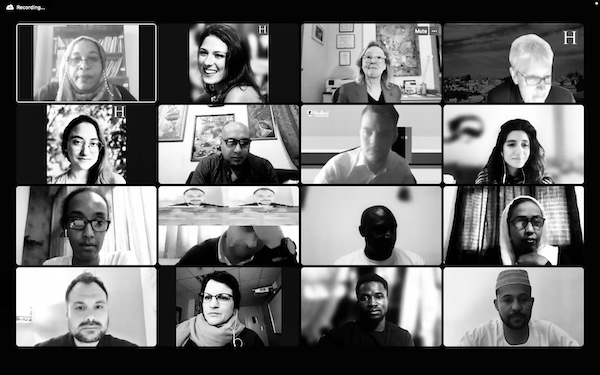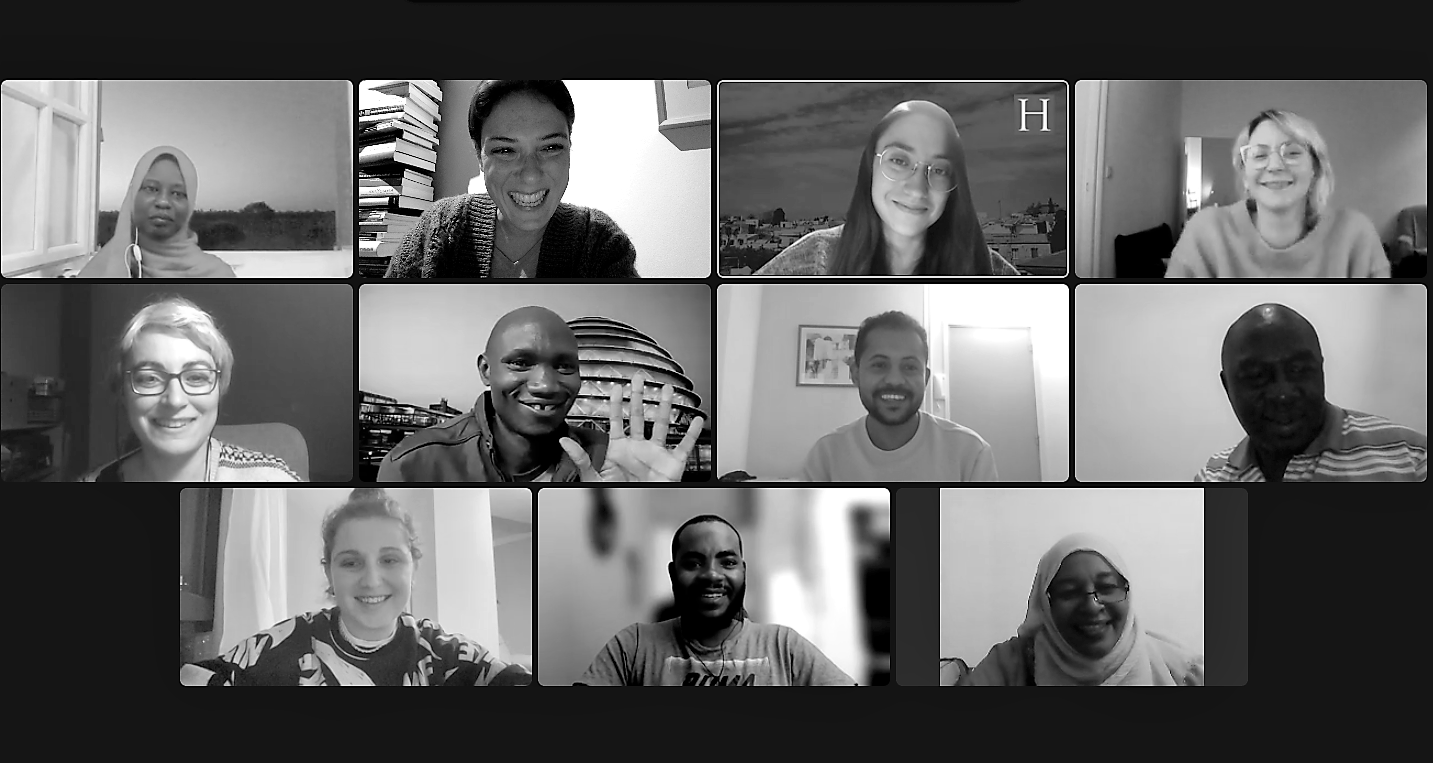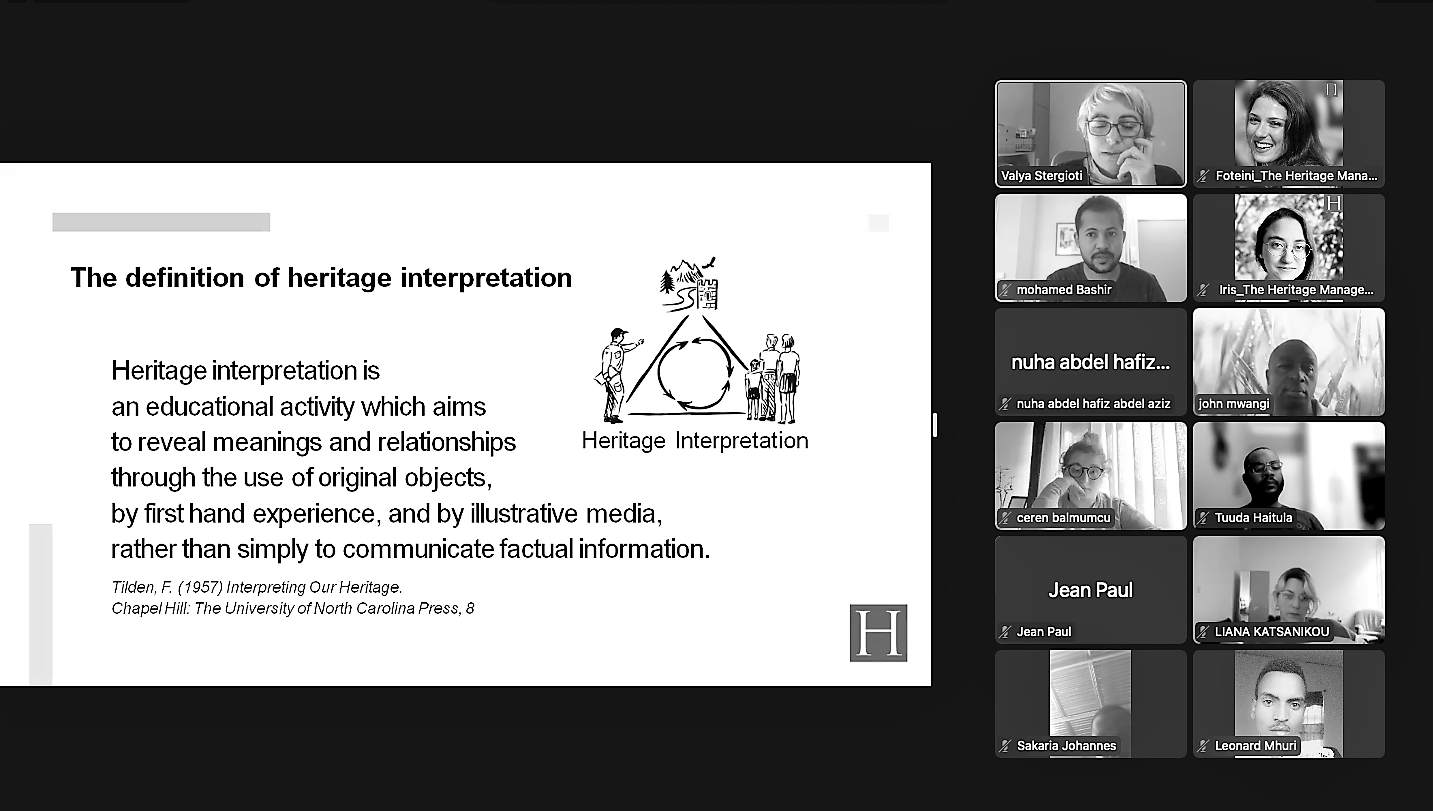: Workshops
Plan ahead, check out our upcoming training opportunities
HERITΛGE is happy to announce three upcoming training workshops for Heritage Professionals.
At HERITΛGE we train professionals in the management of heritage sites, independently of project specifics. We have trained more than 1000 individuals and organizations in over 77 countries and are now on course to impact a quarter of global heritage hotspots by 2025.
Our upcoming opportunities include:
Engaging Communities in Cultural Heritage – Online and In-Person
This course draws from our long experience with community engagement through heritage and will discuss several examples from our own and others’ work. At HERITΛGE aim to develop a distinct approach to community engagement, based on social (and art) research with community-led initiative.
Introduction to Heritage Interpretation for Site Managers – Online
Heritage Interpretation is a structured approach to non-formal learning, specialized in making visitors’ experience meaningful and unforgettable. In this 3-day course, participants will familiarize themselves with the principles of quality heritage interpretation and will practice how to use interpretation on their own sites.
Interpretive Writing for Natural and Cultural Heritage – Online
The key to effective word-based Heritage Interpretation is written text that grabs and holds the reader’s attention. During a 3-day online course, participants will discover and practice a wide range of techniques to engage visitors and master the techniques of interpretive writing.
*There is funding available through the Benefactor Scholarships of the Heritage Management Organizations. The scholarships are available for qualified candidates and cover a large part of the cost, excluding travel and hotel expenses for in-person training.
Empowering Heritage Managers: Insights from the Strategic Planning Workshop
In a rapidly changing world, the preservation and management of cultural heritage require strategic planning and effective decision-making. HERITΛGE’s latest transformative 3-day online workshop titled “Strategic Planning for Heritage Managers” took place in mid-May and brought together 14 heritage managers from Africa, Asia, and Europe, providing them with essential strategic planning skills and knowledge.
Led by Alexandros Papalexandris, Assistant Professor of Management at the Athens University of Economics and Business, the workshop immersed participants in a comprehensive curriculum. Heritage managers from Botswana, Egypt, Ethiopia, Namibia, Tanzania, South Africa, Sudan, India, Syria, and North Macedonia had the opportunity to explore a variety of strategic analysis methods and tools. They gained insights into planning and evaluating alternative strategic options, understanding the requirements of strategy implementation projects, and assessing the macro-environmental factors influencing organizational strategies.
The participants delved into the core concepts of strategy, grasped the importance of strategic planning, and acquired the skills to craft compelling vision and mission statements. Analyzing the business macro-environment, including political, economic, social, and technological factors, were skills on which the heritage managers participating focused intensely during the training. Moreover, the workshop equipped participants with the ability to identify and leverage different types of resources and capabilities to gain a competitive advantage.
Towards Practical Application: To cement their newly acquired skills, participants were divided into three groups, and each group selected a project from within their cohort for an in-depth case study. The chosen projects included the establishment of a Children’s Museum at The Grand Egyptian Museum in Egypt, the preservation of the Palmyra World Heritage Site in Syria, and the development of the Kumanovo Museum in North Macedonia. By working on these real-world projects, the participants had the opportunity to apply their strategic planning knowledge and develop practical solutions.
While the workshop concluded after three intense days, the learning journey continues. Participants will reconvene with their instructor, Alexandros Papalexandris, on May 22nd for a tutorial meeting. This session will provide an opportunity for participants to seek guidance, clarify doubts, and receive valuable feedback to refine their final projects. This personalized approach ensures that the heritage managers are supported as they progress towards implementing their strategic plans.
The workshop featured a keynote speech by Joshua Mwankunda, a distinguished professional with two decades of management experience in government services and overseas assignments. Mr. Mwankunda showcased his expertise in heritage conservation, development, tourism, project management, procurement, and engineering. He has managed successful heritage projects within the Ngorongoro Conservation Area, including the conservation of Laetoli footprints, ElA and CHIA for road upgrades, museum development, and supervised the establishment of Sub Saharan Africa’s first Geopark.
Launching a new Conservation Workshop!
HERITΛGE is happy to announce the launch of a new introductory conservation workshop, designed to equip heritage professionals with the skills and knowledge they need to extend the life of cultural heritage while enhancing the transmission of its messages and values.
Conservation is critical to preserving the physical and cultural characteristics of heritage objects, and ensuring their value is not diminished. Our new 3-day introductory course provides an overview of the principles and objectives of conservation, outlining its methodology, ethics, evolution, and contemporary international context.
“This course is an introduction to the principles of conservation and as such, it is a unique opportunity for our organization to place conservation at the heart of heritage management,” said HERITΛGE Director, Dr. Evangelos Kyriakidis.
Led by Alexis Stefanis, an Assistant Professor at the Department of Conservation of Antiquities and Works of Art of the University of West Attica, Greece, the HERITΛGE conservation workshop is a unique opportunity for heritage professionals to place conservation at the heart of heritage management.
By the end of the course, participants will have gained an understanding of the potential of conservation, and the processes necessary to maximize it. Funding opportunities are available for eligible participants.
Find out more about the workshop, funding opportunities, and the application process here.
Successful Fundraising for Heritage Managers: Strategies and Best Practices
On March 17-19, 2023, a three-day online workshop on “Successful Fundraising for Heritage Managers: Strategies and Best Practices” was held, aimed at equipping heritage managers with fundraising skills and strategies to start-up and build their organizations’ contributed revenue for increased impact in the world. The workshop had 13 participants from Africa (Egypt, Ethiopia, Kenya, Namibia, Sudan), Asia (India), and Europe (Greece, Norway, Serbia, United Kingdom), who were trained on fundraising best practices.
Throughout the workshop, participants learned the best practices on fundraising and how to apply them to create a case for support and a letter of inquiry for their own organization or project. The participants brought to the workshop various projects that they wanted to raise funds for.
These included:
• The Dye House at NMEC,Egypt
• Prosfygika Project, Squatted Monuments in the city center of Athens, Greece
• Creating a Cultural Trail for a Regeneration Site in East London, United Kingdom
• Restoration of Stepwells at Penukonda, India
• Documentation and protection of the abundant village of Old Dongola Sudan
• Identification, Documentation and Marketing of Intangible Cultural Heritage of Esna, Egypt
• City Tour Guide’s Capacity Building Training, Ethiopia
• Heritage Interpretation of Prehistoric Sites, Kenya
• SEE Heritage Network going strong, Serbia
• Systematic excavation, preservation, and documentation of the Meroitic townsite of Kedurma,
Sudan
• Traditional Farming in the Butana area, ethnoarchaeological study, Sudan
• Rundu Youth Academy of Arts, Namibia
• Fotefar mot nord – Trails to the north, Norway.
The workshop had both asynchronous and live sessions. During the asynchronous sessions, participants prepared for an assignment in advance and were updated with reading material and pre-recorded videos on the Moodle platform. In the live sessions, participants presented their assignments and received feedback from instructors. The live sessions were then followed by lectures from workshop instructors.
Participants were also given free access for one month to GrantStationhttps://grantstation.com/ to look for potential prospects for their project, thanks to GrantStation for kindly providing discounted access to participants. Through the workshop sessions, lectures, case studies, various discussions, and interactive exercises, participants were able to develop and apply strategies in fundraising fundamentals, best practices, ethics, working with executive and voluntary leadership, creating and articulating a compelling case for support prospect research, matching projects with sources of support, matching marketable projects with prospective sources of support, identifying, cultivating and soliciting prospects, personally asking for a contribution, securing foundation and corporate grants, writing a compelling letter of inquiry to an actual potential funder, creating a development plan.
On March 27, the participants had a follow-up tutorial, where they met with their instructors to ask questions and receive guidance on how to improve their final project, which is to write a letter of inquiry for their own project. The workshop was a success as the participants left equipped with the skills and strategies needed to fundraise for their various heritage projects.
Workshop Instructors:
Linda C. Hartley, is principal, H2Growth Strategies and former VP of External Affairs at The
Cooper Union for the Advancement of Science and Art. She taught as an adjunct professor for
12 years at the NYU Heyman Center for Philanthropy and Fundraising, and is co-author of the
book, Big Impact: Insights & Stories From America’s Non-Profit Leaders. Hartley holds an M.B.A.
in Management from the Stern School of Business at New York University.
Jennifer E. Herring, is special advisor, H2Growth Strategies, former President & CEO of the
Maritime Aquarium, and former Senior VP of Development of the Wildlife Conservation Society.
Herring currently serves as VP for Development of STEMteachers NYC. She holds an M.A. in
Liberal Studies from SUNY Stony Brook and a certificate in Strategic Perspectives in Nonprofit
Management from Harvard Business School.
“Introduction to Heritage Interpretation for Site Managers” workshop
The online 3-day workshop on “Introduction to Heritage Interpretation for Site Managers” took place from 25 to 27 November 2022.
10 heritage managers from Africa (Rwanda, Tanzania, Namibia, Kenya, Sudan), Europe ( Greece) and Asia (Turkey) have received training on the principles of quality heritage interpretation and practiced how to use interpretation on their own sites.
In this highly interactive and participatory workshop participants engaged daily with both individual and group activities. The workshops’ instructor, Valya Stergioti, tailored the activities and the lectures based on the participants projects and cultural background. Through this process participants learned how to turn phenomena into experiences, provoke resonance in visitors of heritage sites, offer paths to deeper meaning and foster respect for all heritage, as well as how to give and receive feedback to and from their colleagues.
The workshop was conducted by Valya Stergioti.
Valya Stergioti, is a freelance interpretive trainer and planner, with more of 20 years of experience on organizing and implementing interpretive workshops about heritage. As Interpret Europe’s Training Coordinator, along with the members of the Training Team, she is responsible for the creation and implementation of a quality, interpretive training program that will meet the needs of heritage professionals from all over Europe.
A keynote speech was delivered by Ms Olga Karagianni.
Olga Karagianni, after a career in the private sector, moved to live permanently in Andros in 2004 when she started her PhD in Sustainable Tourism.Olga is the inspirational driving force behind the Andros Routes project, leading a volunteer team to restore over 180km of ancient footpaths and helping to develop sustainable hiking tourism on Andros. In October 2018 she launched the successful multi-day “On Foot” Hiking Festival which was repeated again in 2019. She has participated in the Southern Aegean Tourism Observatory as a writer of the action plan for nature and hiking tourism. Olga has a degree in Economics from the University of Athens, a postgraduate degree in Tourism Management and Policy from the Hellenic Open University, and a PhD in Sustainable Tourism.
Executive Leadership Workshop: Communication Strategy and Strategic Marketing for Cultural Organizations
Heritage Management Organization’s ongoing Executive Leadership Workshops on Heritage Management aiming at providing heritage managers with opportunities to develop their professional skills, continues with a steady stream of participants and some of the best instructors available today.
Communication Strategy and Strategic Marketing for Cultural Organizations
What does it take to be an effective communicator? The ability to put your thoughts coherently into words; presentation skills; presence of mind; a combination of all the above?
The participants of the Workshop on Communication Strategy and Strategic Marketing for Cultural Organizations experienced the opportunity to find ways to address this issue through an interactive 3 day course that combined a series of simulation of situations, writing exercises aimed at honing the skills of the participants reaching out to a specific audience, learning the basics of journalism and how to be an effective communicator. The participants ranged from current undergraduate students, recent graduates of the MA program in Heritage Management, PhD candidates, and professionals in the fields of PR and Communications. The workshop was held from the 26-28th of September 2016, in Elefsina.
With more than 30 years of experience as a journalist, Derwin Johnson, the instructor of this workshop, is an independent senior communication executive and educator, currently working as senior counsel at APCO worldwide. Mr. Johnson provides strategic and tactical guidance and is counsel to financial service firms, law firms, governments and Fortune 500 companies representing a wide range of industries, including airline, professional services, and technology, pharmaceutical, health care, hospitality as well as beauty and fashion. His range of clientele extends from governments to Non Profit organizations and Mr. Johnson breaks down the modes of communication according to each audience type. “The idea is to help them understand the type of audience one is addressing. Even something as simple as an Op-ed differs in its language than a Letter to the Editor or an article. Everything has its own voice and it is important to be perceptive enough.”
The 3 day workshop was divided into 3 major categories, as the 6 participants were broken up into 2 teams to tackle the various tasks assigned to them.

Day 1: Developing a Media Tool Kit and learning how to write like a journalist.
On their first day, the workshop’s participants were ‘greeted’ with a ‘welcome package’ that contained a heavy yellow folder with printed material and bibliography on the skills and strategies of an effective communicator. After reviewing the material and with Mr. Johnson’s guidance, they were given team-wise exercises, focusing on story-pitching and ways of approaching journalists or newspapers for a story. The differences between an effective OP-ed and Press release were hashed out with a specific word limit that forced participants to think within the boundaries and thus, use the most effective language they could.
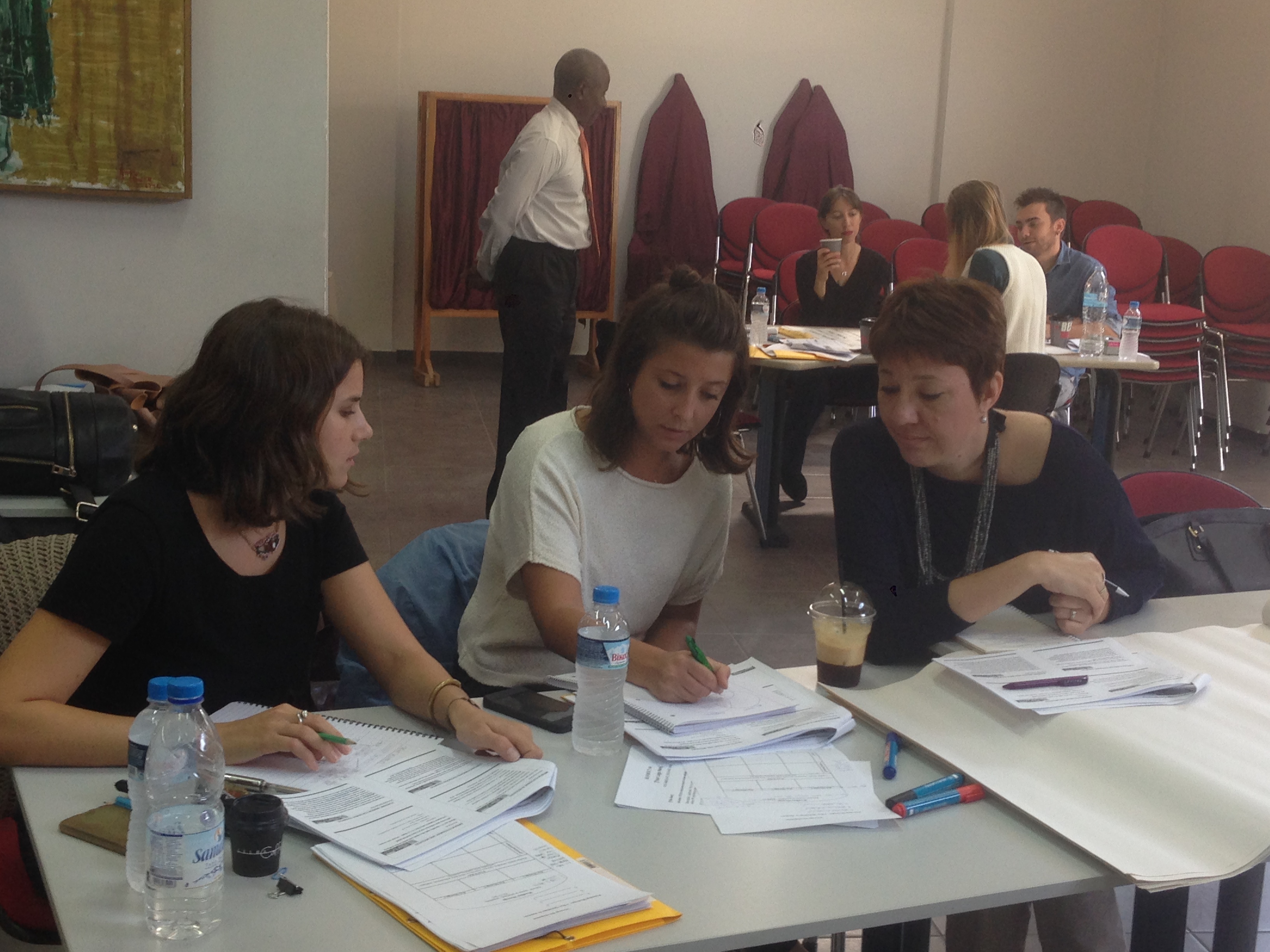
Groups were divided into 2 teams to work on the specific press releases and other communication texts.
Day 2: Online Communication and Social Media and the nuances of traditional media versus that of the online realm.
The thin line between a concise and specific blog and the art of using social media as a communication tool were addressed on Day 2, as participants practiced in writing a blog and learned about customizing content. The transition from traditional media outlets towards social media, comes with its own set of rules and challenges and participants enjoyed a day of experiencing the benefits of social media and using them to get a specific message across.

The simulation sessions were captured on video to help participants understand self evaluate their performance
Day 3: Crisis Simulation: a hands on experience of being the spokesperson during a hypothetical crisis situation and dealing with it diplomatically
On the last day of the workshop, the participants were literally put under the spotlight as each had to act as a spokesperson to a given crisis situation, a delicate matter that involved a participant in one of HMO’s summer schools falling in love with a local, getting pregnant and being faced with the prospect of marriage and life in a traditional, remote village of the Greek countryside. During a simulated press-conference, each participant embodying the role of the spokesperson in charge had to handle this sensitive issue as well as address the ‘fiery’ questions of a team of media representatives, acted mainly by Mr. Johnson himself. The exercise was recorded with a camera and later reviewed by the whole group. As each answer was meticulously scrutinized by Mr. Johnson, every participant had the opportunity to receive personalized feedback and guidance on the effectiveness of his/hers responses.
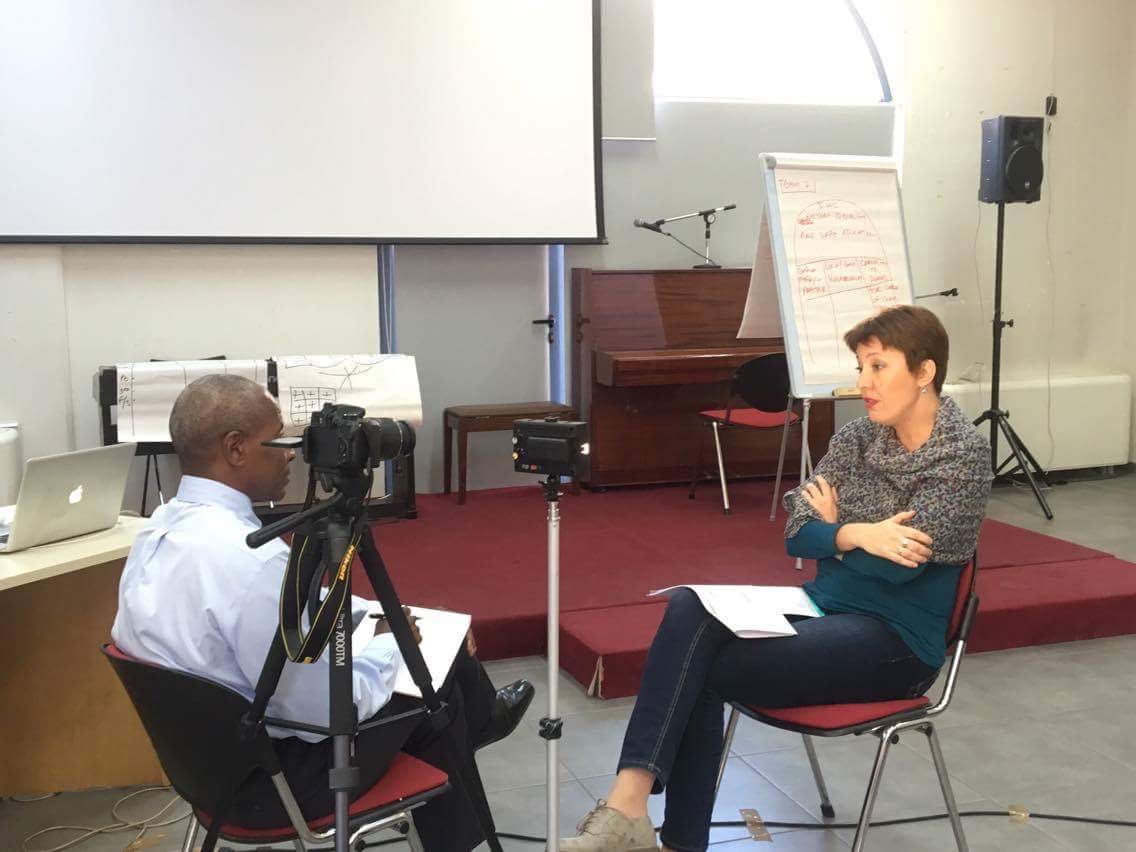
The Crises simulation exercise was captured on film while the participants were individually pur under the spotlight for questioning
Overall, the 2017 Communications Workshop aimed at enabling the participants with the required skills and confidence at becoming better communicators in their chosen career paths as heritage managers. In a take home exam, they were asked to build a Strategic Communication Plan for the HMO and specifically describe their methods for communicating their strongest messages to target audience(s), using the right media channels to make an impact, thus getting an effective response. The participants took away more than their learnings from the workshop, such as the network they built by working together during these intense three days as well as a unique skill set that would give them an edge in their future endeavors. The participants shared their after thoughts on their experiences and how they could put them to use in their work.
The 6 participants shared their thoughts on their 3 day experience:

Korica Ljiljana, a PR manager for the Hellenic Foundation for Culture, Serbia: “I looked forward to the opportunity for working with participants from different backgrounds. Although I have been working for 8 years in the Hellenic Foundation for Culture, I have never received a practical training that is directly related to my professional duties. I loved how Mr. Johnson encouraged us to think out of the box and it opened up new avenues of thought for me. I believe that after attending the workshop, I would be able, based on the hands-on principles that we learnt, to make an initial, long-term, step-by-step communication plan for the Hellenic Foundation for Culture/for my Organization, and define the directions and principles that would guide it in the future.”
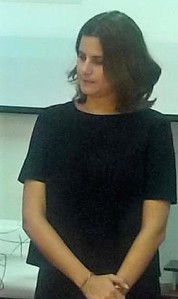
Sarah Fanelli, an advanced MA candidate in HMO’s program in Heritage Management, from the US: “I originally wanted to join the workshop to learn more about publicity and communications involving press releases and announcements on all types of media. My biggest concerns were how to make the invitation’s message both clear and enticing to a wide public, while still maintaining the nuances important to a niche sector of those in culture, heritage, and the arts. Mr. Johnson was especially great at catching us off guard, instances that happen in reality and he instructed us on how to constantly be on guard. I believe that by attending this Communications Workshop, I am now better able to clarify and streamline ideas for specific audiences using what is basically a formula, using Mission Statement, Headline Message, Key Messages, and Proof Points. Because I will be completing the MA program shortly, I feel like I can now clearly communicate my experiences with the MA and what I can contribute to future projects and employers.”

Josephine Perdikidou, a Greek undergraduate student of archaeology in the National and Kapodistrian University Athens: “I seek to enhance public awareness concerning cultural heritage through my love for history and archaeology without ignoring the accelerating growth of urbanization, caused by profound changes in the world. The fine line that separates the present and past shows how significant each and every historical event is in shaping our future. As a result, museums shouldn’t be regarded as graveyards of memory but as thresholds of memory. I thought this workshop gave me the right tools to apply in my quest to raise awareness on my favorite subjects and I really hope I can find the right way to do it!”

Hakan Tarhan, from Turkey and a recent MA graduate of HMO’s program and current PhD candidate for cultural heritage analysis and management at IMT School of Advanced Studies in Italy, felt the workshop helped him to further consolidate his ideas on how to communicate his work and projects and develop the skills necessary to improve as a heritage manager.

Adriana Gilroy, a freelance Creative Strategist from the US: “After the workshop, I had a better sense of what needed to be done with regards to the promotion of my Kefalonia project. I was equipped with great strategies for garnering attention from media outlets, bloggers, and other media channels. I will be able to put together a toolkit for my project in order to better communicate the mission to interested parties.”

Petek Göker Erkose, a History lecturer from Turkey: “I found the contents of the course most challenging as it was not my forte, so I really learnt a lot from the techniques and the simulation exercises we did. In this age of digitization, communication has new rules and takes new dimensions to catch up with the latest trends in the marketing field. This workshop was a great introduction to become acquainted with the basics of communication strategies as well as the more sophisticated methods covering whole steps of designing and executing a communication plan for an institution.”

